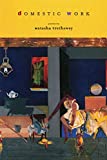Ed Simon at The Millions:
 Fallacy though it may be to imagine the narrator of a verse as equivalent with the poet, it’s impossible not to imagine the words of Robert Frost read in that clipped Yankee-via-San-Francisco accent of his, to intuit the blistering cold of a New Hampshire morning or the blinding whiteness of the snow-covered Franconia Range, the damp exertion of sweat under a flannel collar and muddy boots trudging across yellow and brown leaves slick with early morning ice. Frost is forever a poet of loose coffee grounds dumped into boiling water and intricate blue and red quilts, of wooden spoons hanging from hooks next to gas stoves and of curved glass hurricane lamps, of creaking wooden floorboards and doors swollen with summer’s humidity. Visiting his white clapboard, gable-peeked farmstead in Derry, New Hampshire, and perambulating in the golden woods of sugar maple and red oak and it’s hard not to romanticize the old man, eyeing him along the rough granite stone wall that he mended every spring, the famous structure whereby “Good fences make good neighbors,” which he wrote about in his 1914 collection North of Boston. The poet was always fixing things—mending, building, working. Our greatest singer of chores.
Fallacy though it may be to imagine the narrator of a verse as equivalent with the poet, it’s impossible not to imagine the words of Robert Frost read in that clipped Yankee-via-San-Francisco accent of his, to intuit the blistering cold of a New Hampshire morning or the blinding whiteness of the snow-covered Franconia Range, the damp exertion of sweat under a flannel collar and muddy boots trudging across yellow and brown leaves slick with early morning ice. Frost is forever a poet of loose coffee grounds dumped into boiling water and intricate blue and red quilts, of wooden spoons hanging from hooks next to gas stoves and of curved glass hurricane lamps, of creaking wooden floorboards and doors swollen with summer’s humidity. Visiting his white clapboard, gable-peeked farmstead in Derry, New Hampshire, and perambulating in the golden woods of sugar maple and red oak and it’s hard not to romanticize the old man, eyeing him along the rough granite stone wall that he mended every spring, the famous structure whereby “Good fences make good neighbors,” which he wrote about in his 1914 collection North of Boston. The poet was always fixing things—mending, building, working. Our greatest singer of chores.
more here.
